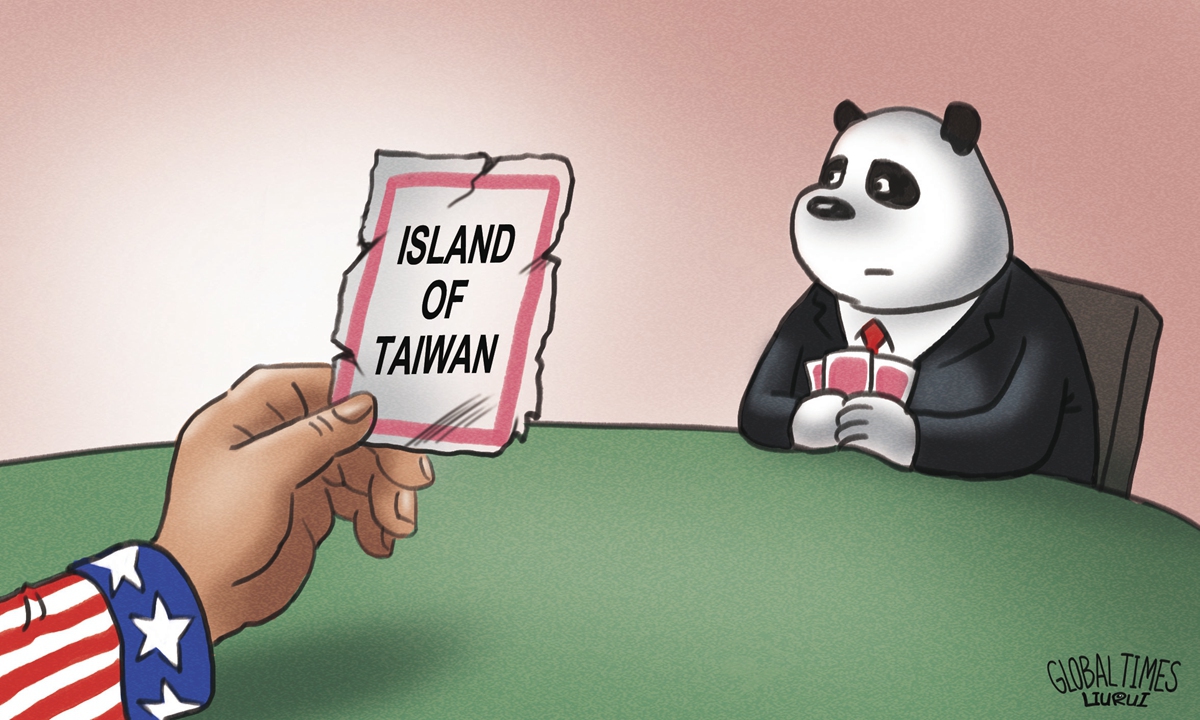
Illustration: Liu Rui/GT
On Wednesday local time, while attending an event organized by Bloomberg, US Secretary of State Antony Blinken once again stated that Beijing "wanted to speed up the process by which they would pursue reunification." He also groundlessly accused China of undermining the decades-long status quo that has kept both countries from going to war over the island of Taiwan. This is the third time in 10 days that Blinken has made similar statements publicly. It is worth noting that all three statements were made in exclusive media interviews and on public occasions, showing a strong implication of public opinion build-up. At the same time, in response, some people in Taiwan island also started to agitate for and play up the risk of a "war in the Taiwan Straits."
The 20th National Congress of the Communist Party of China (CPC) once again demonstrated a consistent and clear policy toward the island of Taiwan. Against this backdrop, on the contrary, the US and Taiwan's recent clamor for a "war in the Taiwan Straits" has completely revealed their motives and purposes of taking any opportunity to incite the risk of war and exacerbate the tension in the Straits.
First of all, as the US midterm elections approach, politicians in Washington have more obvious motives to hype up the Taiwan question. It has become a rather common and despicable political speculation for these people to gain attention and show presence for themselves and the parties they represent by provoking China's core interests. The US dealing with its domestic affairs appears in the form of interference in other countries' internal affairs, which is a typical characteristic of hegemonic states.
Washington's politicians are "persistent" in releasing false signals to the "Taiwan independence" forces, as if they would keep pushing those secessionist forces until they fall off a cliff. The island's Democratic Progressive Party (DPP) authorities and secessionist forces have long been helpless addicts who can easily get high over the slightest "false signal" concocted for them by Washington. Once Washington fails to supply them with such a signal in time for whatever reason, they will feel flustered and devastated. They have already stepped on a desperate path to satisfy their need for "political drugs" to hypnotize, deceive and cheer up themselves.
In response to questions from the media on Wednesday, a spokesperson for the Taiwan Affairs Office of the State Council said he has noted the recent rampant remarks advocating the so-called "war across the Straits." He urged the US to abide by the one-China principle and the three China-US joint communiqués, and reminded people to be highly vigilant against attempts of the DPP and those politicians in the "green" camp to use the topic of war to cooperate with external forces to exaggerate the so-called "mainland threat," and seek excuses for continuing to confront the mainland and engage with external forces for "separatism" provocations, or even "seeking separatism with armed forces." The US and Taiwan island are, in essence, using each other to undermine peace and stability across the Taiwan Straits.
In recent years, like parrots lined up, American and Western politicians shamelessly claimed that they "oppose unilateral changes to the status quo across the Taiwan Straits." What is the status quo of the Taiwan Straits? The answer is very clear: Both sides of the Straits belong to "one China," Taiwan is a part of China, and the sovereignty and territory of China have never been divided. In the past few decades, although there have been occasional waves in the Taiwan Straits, it has generally maintained peace and stability. The one-China principle is the key stabilizing force for peace and stability across the Taiwan Straits. To violate and challenge the one-China principle is really to change the status quo across the Taiwan Straits. This is the culprit to stir waves across the Straits.
Nowadays, Washington often talks about "peace," but it does not mention the true "one China." The US is continuously putting forward Taiwan-related bills disregarding the written commitments it made. Using the excuse of seeking "peace" to instigate war, Washington has long demonstrated its hypocrisy, and the truth has become clearer: It's the Taiwan secessionists and external forces, as well as the increasingly rampant US-Taiwan collusion, that are the perpetrators of destroying the peaceful environment across the Straits.
It is the Chinese people's own business to solve the Taiwan question. It is the Chinese people themselves who are most eager for a peaceful reunification across the Taiwan Straits, as this is most in line with the overall interests of the Chinese nation, including the Taiwan compatriots, and is most conducive to China's long-term and stable development. The report delivered to the 20th National Congress of the CPC reiterated that we will continue to strive for peaceful reunification with the greatest sincerity and utmost effort, but we will never promise to renounce the use of force, and we reserve the option of taking all measures necessary. It is conceivable that the "Taiwan independence" forces and external forces have felt a strong deterrent because of this, while it's not difficult for the majority of Taiwan compatriots to understand the goodwill and sincerity of the Chinese mainland in promoting peaceful reunification across the Straits.
At the opening ceremony of the 20th National Congress of the CPC, when General Secretary Xi Jinping said that "Complete reunification of our country must be realized, and it can, without doubt, be realized," there was a prolonged applause at the venue. This reveals the common aspiration of more than 1.4 billion mainland compatriots and the sons and daughters of the Chinese nation, both at home and abroad. It is a historical trend that can't be stopped by any force. We look forward to the coming of this day together with the Taiwan compatriots.




